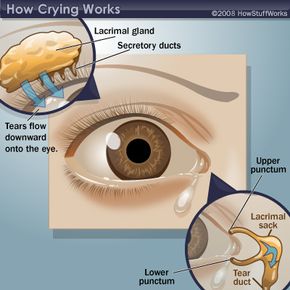How Your Body Reacts When You Cry The Effect Of Crying

How Your Body Reacts When You Cry The Effect Of Crying Youtube As a result, it causes your glottis—the opening between the vocal chords in your throat—to swell up, making your throat feel full and tight. “the body is trying to protect you so you don’t. Through crying. it causes the opening between your vocal cords to swell and feel tight, resulting in the typical lump in the throat that you feel when you’re about to cry. also, your heart rate tends to speed up and your voice becomes shaky. the sympathetic nervous system protects us from emotional intensity by crying.

How Crying Works Howstuffworks However, research strongly suggests that the possible mood benefits of crying for the crier depend to a great extent on how observers react to the tears [5,6]. perhaps the direct effects of crying itself, if any, are very limited at best (see, however, ). more recently, the focus of research has turned to the effects of tears on observers in. Although crying can be the bridge that leads to a more restful state, “in the short term of minutes, there is clear evidence that the act of crying is highly arousing,” he says. “people who cry exhibit elevated heart rates and increased sweating. in this sense, crying is a ‘workout’ for the body. Helps relieve pain. the endorphins your body releases when you cry can help alleviate certain types of pain. the physical act of crying also activates your parasympathetic nervous system, which helps promote relaxation, reduce stress, and may help manage pain. the emotional release that comes with crying also helps to diminish feelings of. Negative effects on people who cry excessively. excessive crying have strong negative effects on one’s physical health. dehydration: tears and sweats from crying can remove fluid from the body, and result in dehydration. many symptoms, including thirst, dry mouth, fatigue, headaches, dizziness, and dark urine, can be brought on by dehydration.

Comments are closed.